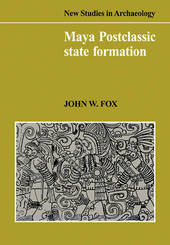
|
Maya Postclassic State Formation: Segmentary Lineage Migration in Advancing Frontiers
Paperback / softback
Main Details
| Title |
Maya Postclassic State Formation: Segmentary Lineage Migration in Advancing Frontiers
|
| Authors and Contributors |
By (author) John W. Fox
|
| Series | New Studies in Archaeology |
|---|
| Physical Properties |
| Format:Paperback / softback | | Pages:328 | | Dimensions(mm): Height 244,Width 170 |
|
| Category/Genre | Prehistoric archaeology |
|---|
| ISBN/Barcode |
9780521101950
|
| Classifications | Dewey:972.01 |
|---|
| Audience | | Professional & Vocational | |
|---|
| Illustrations |
Worked examples or Exercises
|
|
Publishing Details |
| Publisher |
Cambridge University Press
|
| Imprint |
Cambridge University Press
|
| Publication Date |
18 December 2008 |
| Publication Country |
United Kingdom
|
Description
John Fox here offers a fresh and persuasive view of the crucial Classic-Postclassic transition that determined the shape of the later Maya state. Drawing this data from ethnographic analogy and native chronicles as well as archaeology, he identifies segmentary lineage organisation as the key to understanding both the political organisation and the long-distance migrations observed among the Quiche Maya of Guatemala and Mexico. The first part of the book traces the origins of the Quiche, Itza and Xiu to the homeland on the Mexican Gulf coast where they acquired their potent Toltec mythology and identifies early segmentary lineages that developed as a result of social forces in the frontier zone. Dr Fox then matches the known anthropological characteristics of segmentary lineages against the Mayan kinship relationships described in documents and deduced from the spatial patterning within Quiche towns and cities. His conclusion, that the inherently fissile nature of segmentary lineages caused the leapfrogging migrations of up to 500km observed amongst the Maya, offers a convincing solution to a problem that has long puzzled scholars.
|